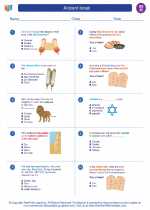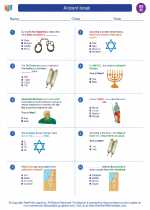Kingdoms of Israel and Judah
The Kingdoms of Israel and Judah were ancient kingdoms in the Levant region of the eastern Mediterranean. They played a significant role in the history of the ancient Near East and hold great importance in the religious traditions of Judaism, Christianity, and Islam.
Background
After the death of King Solomon, the Israelite kingdom split into two separate entities: the northern Kingdom of Israel and the southern Kingdom of Judah. This division occurred around 930 BCE and was the result of political and religious tensions within the Israelite population.
Kingdom of Israel
The Kingdom of Israel, also known as the Northern Kingdom, was centered around the city of Samaria. It was comprised of ten of the twelve tribes of Israel and was known for its instability and frequent changes in leadership. The kingdom fell to the Assyrians in 722 BCE, and its population was exiled, leading to the legend of the "Lost Tribes of Israel."
Kingdom of Judah
The Kingdom of Judah, also known as the Southern Kingdom, was centered around Jerusalem and was comprised of the tribes of Judah and Benjamin. It was more stable than the Kingdom of Israel and lasted longer, eventually falling to the Babylonians in 586 BCE. The Babylonian Exile, during which the elite of Judah were taken to Babylon, is a significant event in Jewish history.
Religious and Cultural Significance
The Kingdoms of Israel and Judah are central to the religious narratives found in the Hebrew Bible (Old Testament). The stories of the kings, prophets, and events in these kingdoms form a crucial part of the religious and cultural heritage of Judaism and Christianity.
Study Guide
- What were the causes of the division of the Israelite kingdom after the death of King Solomon?
- Describe the differences between the Kingdom of Israel and the Kingdom of Judah in terms of geography, demographics, and political stability.
- Explain the significance of the Babylonian Exile and its impact on the Kingdom of Judah.
- Discuss the religious and cultural importance of the Kingdoms of Israel and Judah in the traditions of Judaism and Christianity.
◂Social Studies Worksheets and Study Guides Eighth Grade. Ancient Israel

 Worksheet/Answer key
Worksheet/Answer key
 Worksheet/Answer key
Worksheet/Answer key
 Worksheet/Answer key
Worksheet/Answer key
